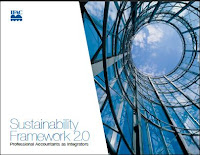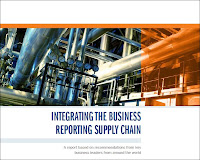“The role of leadership and business strategy is to promote the integration of sustainability issues at a strategic level, so that they are embedded in organizational development covering strategy, planning, enterprise risk management, and operations. The importance of tone at the top is best captured by the King Code of Corporate Governance for South Africa, which specifically encourages the integration of governance and sustainability into strategy, operations, and reporting of an organization. The philosophy of the King code revolves around leadership, sustainability and corporate citizenship. Responsible leaders direct company strategies and operations with a view to achieving sustainable economic, social and environmental performance.” (Read the publication Sustainability Framework 2.0: Professional Accountants as Integrators, issued by the International Federation of Accountants (IFAC) in March 2011.)
Wednesday, June 29, 2011
Sustainability Framework 2.0: Professional Accountants as Integrators
Monday, June 27, 2011
Integrating the Business Reporting Supply Chain
High-quality business reporting lies at the heart of strong capital markets and sustainable economic growth. All those involved in the business reporting supply chain play a critical role in making business reports more relevant, understandable and reliable. This will enable the various stakeholders who use those reports to make informed decisions with respect to an organization’s social, environmental, and economic performance.
Recent interviews with key business leaders from around the globe capture recommendations on governance, financial reporting, financial auditing, and broader business reporting from prominent preparers, directors, auditors, standard setters, regulators and investors. This report analyzes what, according to interviewees, the various participants in the business reporting supply chain should do to further improve governance and the usefulness of business reports, as well as the preparation and audit of those reports. Unless otherwise stated, the recommendations in this report apply to all organizations and businesses. (For more information, read the March 2011 IFAC report Integrating the Business Reporting Supply Chain.)
Friday, June 24, 2011
IBM celebrates 100 years
“Of the top 25 industrial corporations in the United States in 1900, only two remained on that list at the start of the 1960s. And of the top 25 companies on the Fortune 500 in 1961, only six remain there today. Some of the leaders of those companies that vanished were dealt a hand of bad luck. Others made poor choices. But the demise of most came about because they were unable simultaneously to manage their business of the day and to build their business of tomorrow. As you read this, IBM begins its 101st year. Today we take a moment to step back and view the longer arc of history. We’d like to share some of what we have learned—sometimes in humbling ways—on our journey so far.” Read the full essay on the IBM 100 website. Explore an evolving collection of stories about the 100 IBM innovations that helped shape the last century. Celebrate IBM’s 100-year history with commemorative memorabilia designed exclusively for IBMers, families and friends.
Wednesday, June 22, 2011
20 Questions Directors Should Ask about Information Technology Security
“The CICA’s Information Technology Advisory Committee developed this booklet to guide Boards of Directors in evaluating information technology (IT) security issues. It should also be of use to other bodies responsible for governance — in particular audit committees and strategic bodies such as IT steering committees, risk management committees, and CEO/CFO controls certification committees. Directors are expected to satisfy themselves that risks potentially jeopardizing the integrity of information, the availability of information and operational systems, the confidentiality of sensitive data, and compliance with regulatory bodies, are identified and reduced or eliminated. This booklet provides questions for Boards to ask senior management as well as the context needed to ask the questions and assess responses. In this document, IT Security (Security) is defined as the protection of data captured, processed, transmitted, reported and stored electronically. IT Security also covers the protection of related components such as application systems, system software, networks and hardware, as well as the supporting people, policies, procedures, processes and organization.” (Read the CICA publication 20 Questions Directors Should Ask about Information Technology Security.)
Labels:
CICA,
IT,
risk and uncertainty,
risk management,
security
Friday, June 17, 2011
Green Gauge
The idea that business organizations have a responsibility to account for their impact on the environment once seemed radical, even eccentric. Now, it is accepted as a mainstream concept – but to put it into practice, corporate reporting will have to evolve dramatically. It’s a challenge to which the accountancy profession must step up, if it is to retain its relevance in the 21st century. As a start, the Sustainability Advisory Group of the Institute of Chartered Accountants of Scotland (ICAS) has launched a dedicated section on the institute’s website providing links to a number of useful resources and a template Corporate Social Responsibility Report. (Read the article “Green Gauge” in the May 2011 issue of CA Magazine (Scotland) online.)
Wednesday, June 15, 2011
Data-Centric Security - A CICA White Paper
In most organizations, data that was once static and stored in one place now moves freely from platform to platform throughout the organization and beyond. Because data is now often generated and modified by users and is resident in different forms and versions in different places simultaneously, maintaining a secure environment is a growing challenge. A White Paper issued by the Canadian Institute of Chartered Accountants (CICA) suggests that a data-centric policy should be the focus for management, auditors and others involved in securing data in this new mobile environment. The term “security” is taken in its broadest sense to include confidentiality, integrity (accuracy, completeness and validity) and availability. (Read the CICA publications on Data-Centric Security and
Labels:
CICA,
collaboration,
data integrity,
data theft,
IT,
reputation risk,
risk management,
security
Monday, June 13, 2011
A Framework for Board Oversight of Enterprise Risk
The Risk Oversight and Governance Board of the Canadian Institute of Chartered Accountants (CICA) has developed "A Framework for Board Oversight of Enterprise Risk" to provide a practical approach to risk oversight, including a methodology and tools designed specifically for boards of directors. The framework includes a nine-part process to assist boards in better identifying and addressing critical risk as well as understanding the inter-connectivity of risks.
Friday, June 10, 2011
Social IR becoming more important in Europe, says study
"While investor relations departments in Germany, Austria, Switzerland and the UK mostly shy away from using social media, there is a growing belief that new media will become increasingly important to their communications with investors in the next 12 months, a new survey has found. The survey by the German investor relations association DIRK and international market research firm GfK polled more than 700 investor relations departments across the four countries. It found that relatively few are currently using social media in their IR programs, with only 12% German, 24% of Austrian and Swiss, and 26% of British IR departments saying they consider social media important or very important to their current IR activities. However, going forward 71% of Austrian, 62% of Swiss, 61% of British and 46% of German companies expect social media to become important or very important to their IR programs in the coming year." (Read the full article “Social IR becoming more important in Europe, says study” by Dominic Jones at IR Web Report online.
Wednesday, June 8, 2011
Canadian income tax, then and now
It has been almost 40 years since Canada overhauled its tax system, eliminating estate duties and bringing in capital gains tax. Since 1972, we have seen no less than 49 editions of the Income Tax Act. Its length has increased enormously and the complexity exponentially. Changes in technology have aided the Canada Revenue Agency in the selection and audit of taxpayers. Ever-changing legislation, powerful audit tools, information exchange agreements and anti-avoidance rules have made tax planning harder, tax compliance more challenging and tax enforcement easier with key changes over the past 40 years and challenges presented to the accounting profession. (Read the article “Income tax, then and now” in the June-July 2011 issue of CAmagazine online.)
Labels:
accounting history,
auditing,
CAmagazine,
complexity,
corporate reporting,
IT,
regulation,
taxation
Monday, June 6, 2011
CICA Corporate Reporting Awards celebrate 60 years of excellence
This year marks the diamond anniversary of the Chartered Accountants of Canada’s Corporate Reporting Awards. Since 1941 the program has been centre stage in Canada’s evolution to best practice reporting models. By providing important recognition for those committed to advancing business reporting, the program has helped drive the development of best practices in financial reporting, corporate governance disclosure, electronic disclosure and sustainable development reporting, all of which are now regarded as essential components of the corporate reporting model. Judging organizations include the Canadian Institute of Chartered Accountants (CICA), PricewaterhouseCoopers, Ernst & Young, Deloitte, International Institute for Sustainable Development, Canadian Investor Relations Institute, and Toronto CFA Society. (Read the article “Corporate Reporting Awards celebrate 60 years of excellence” in the June-July 2011 issue of CAmagazine online.)
Wednesday, June 1, 2011
OPEN Forum Social Media Hub
American Express offers an online OPEN Forum Social Media Hub. To discover the mix of tools and tactics best suited for a business, the site provides a collection of relevant content including clips from a Social Media panel, OPEN Book: Social Media, Insight Guides, expert articles and more.
Labels:
collaboration,
communications,
innovation,
social media,
stakeholders,
Web 2.0
Subscribe to:
Comments (Atom)












